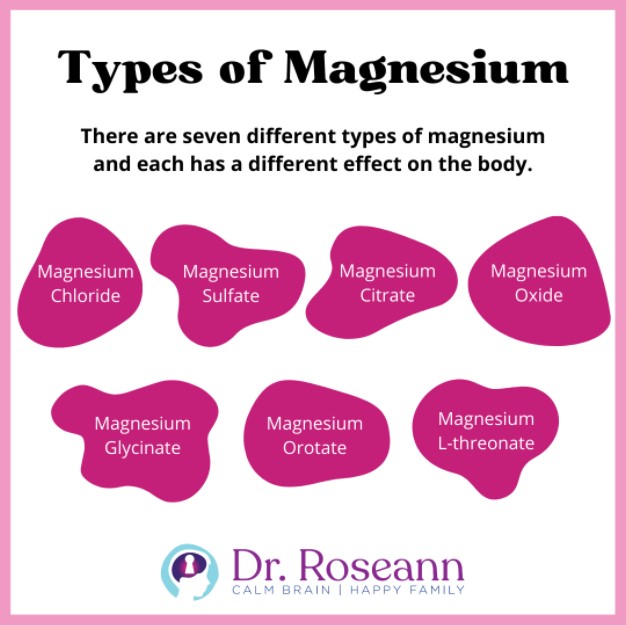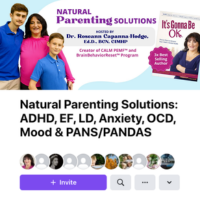Magnesium is the most used nutrient in the body and when you are stressed, you just can't get enough of it. By supplementing with magnesium, you not only calm the nervous system, you help your body combat stress and give what it needs to work at an optimal level and combat mental health symptoms.
There are many supplements that help to calm the brain and reduce stress. One of the most prominent natural anxiety supplements, Magnesium, is a cofactor in more than 300 enzyme systems that regulate diverse biochemical and enzymatic reactions within the body. Magnesium is required for its assistance with many chemical functions that support the central nervous system in managing stress.
Since the majority of Western populations consume less than the recommended amount of magnesium, supplementation is often needed to support the brain and body.
Types of Magnesium
There are seven different types of magnesium and each has a different effect on the body.
- magnesium chloride
- magnesium sulfate
- magnesium citrate
- magnesium oxide
- magnesium glycinate
- magnesium orotate
- magnesium L-threonate
You can take a magnesium supplement or you can take a magnesium salt bath or even do both. With so much stress in the world, we need a ton of calm magnesium supplement to support the brain and body, so adding magnesium supplements is a simple way to improve cognitive function and get better sleep.

Magnesium Calms the Brain
When the nervous system is hyper stress activated and the brain reaches maximum capacity, the brain can only respond in three ways, fight, flight, or freeze. There are a variety of techniques that when consistently applied, help to lower the activation response.
It all starts with reconnecting to the body and understanding the signals your body gives you before your brain goes into fight, flight or freeze. Understanding those somatic responses empowers a person to utilize tools to help calm their nervous system especially feeling frozen like with panic attacks.
When you are in a fight, flight, or freeze state, you are in survival mode and your brain and it's heightened state is unable to fully process language, pay attention, or take action outside of survival. In other words, The brain and body‘s primary objective in this state is to reduce stress and that means ignoring most other stimuli and focusing on just getting through this stressful time.
Magnesium is required for its assistance with many chemical functions that support the central nervous system in managing stress. And when we calm the brain, it allows for the mental capacity to do psychotherapy such as cognitive behavioral therapy and other therapies that focus on how to change your thoughts and actions.
Magnesium Improves ADHD Behaviors
When focus and alertness issues and other ADHD symptoms are present, the day to day life of children with ADHD and their families can be a challenge. The constant need for verbal reminders breaks down the parent-child relationship and leads to a whole lot of friction.
The clinical and biochemical manifestations for those with Attention-Deficit Hyperactivity Disorder range from inattentive symptoms to hyperactive-impulsive ones. Some children are prone to hyperfocusing and difficulty with transitioning. Children with attention deficit face many challenges at home and school and parents need effective natural solutions. Cognitive enhancers such as magnesium supplementation or vitamin D supplmentmentation can lead to improved alertness.
Magnesium for an ADHD child can support their brain and improve not just attention but sleep and cognitive processing. Magnesium for kids with ADHD can be a safe alternative to the side effects of medication.
There is a significant correlation between magnesium deficient children and neurobehavioral disorders, such as ADHD and autism. For parents looking not to medicate their child with ADHD, magnesium is an important nutrient clinically proven to improve focus, reduce impulsivity and improve execitive functioning and cognitive functioning. It can also help improve autism symptoms as well.
Getting the brain to regulate is a key component of our BrainBehaviorReset™ Method and because the science is clear that with a stress activated nervous system, you simply can't pay attention. Calming the brain is a key component to helping improve attention and magnesium is an effective way to do just that. Focusing on natural ADHD solutions is important for the developing brain.
Magnesium Improves Brain Chemicals that Help Anxiety, OCD, Depression, and ADHD
Magnesium is an important regulator of neurotransmitter signaling, especially for the neurotransmitters glutamate and GABA through modulating the activation of NMDA glutamate and GABA receptors.
Magnesium is needed for energy production, or what is referred to as mitochondrial function, and the glucose breakdown for energy (glycolysis). Brain energy (cerebral) metabolism is often associated with anxiety and social behavior.
Magnesium is required for the synthesis of DNA, RNA, and the antioxidant glutathione, which is a powerful antioxidant that supports detoxification and a healthy immune system. Oxidative stress and issues with poor detoxification are associated with increased levels of anxiety, as well as numerous mental health conditions.
These actions serve to calm the brain, which decreases symptoms associated with clinical conditions such as anxiety, obsessive compulsive disorder, mood disorder, and attention-deficit hyperactivity disorder.
There is an abundance of research that shows magnesium supplementation can improve symptoms across a variety of neurological and clinical conditions (Kirland et al., 2018). The surprising part for most people is that there are scientific studies that show just how effective magnesium supplementation can be in improving mental health and neurological conditions.
Magnesium Puts The Breaks on the Intrusive Thoughts
In terms of neurotransmitters and mental health, magnesium inhibits the release of excitatory neurotransmitters and can increase feel good brain chemicals such as serotonin. For example, people with OCD have too many excitatory neurotransmitters that cause the brain to get stuck with an intrusive thought loop.
Calming down those excitatory neurotransmitters gives someone with OCD enough room to employ the tools they learn in Exposure and Response Prevention (ERP) therapy.
Magnesium Helps Reduce Anxiety
When we are stressed or anxious, it shows up as runaway thoughts and physically in a multitude of ways such as body tension, pain, difficulty sleeping, etc. Feelings of anxiety can be very overwhelming and not only affect brain function, but can wear the body and mind out and lead to depressive symptoms and even mood disorders.
Studies suggest that magnesium helps different types of anxiety disorders, including generalized anxiety disorder (GAD), social anxiety disorder and selective mutism, panic disorder, separation anxiety disorder, specific phobias, and helps to reduce physical and cognitive symptoms of anxiety.
With the impact of extended periods of social isolation during the pandemic, social anxiety and anxiety-related difficulty in social situations is on the rise. Even the more extreme versions of social anxiety are increasing, as I have had more calls to our Ridgefield, CT center about selective mutism and anxiety symptoms in general, in the last year than I have had in the last 5 years combined.
Magnesium plays an important role in the hypothalamic-pituitary-adrenocortical (HPA) axis to help manage the body's stress response system, as well as supports healthy neurotransmitter functioning. People with anxiety disorder need relief that doesn't have side effects and magnesium should be a part of everyone's toolkit.
You will read statements like, “magnesium cured my anxiety” but magnesium is just a tool in reducing anxiety symptoms. Don't get me wrong oral magnesium supplementation can result in a significant reduction of anxiety symptoms but the real work in in building a tolerance for stress and learning coping skills.
How do I Know if I Need Magnesium?
With our stress-filled world, it is so easy to run low on the all important magnesium because it is so needed to help other body functions (more than three hundred!).
There is a lot of research that shows the connection between low magnesium levels and clinical mental health conditions such as ADHD, anxiety, depression, and OCD. There is also research that helps us to understand symptoms seen with those with low magnesium levels.
Symptoms of Magnesium Deficiency
- Feeling stressed or anxious
- Poor sleep quality
- Difficulty getting to sleep
- Have a diagnosed clinical mental health condition
- Fatigue and muscle weakness
- Poor appetite
- Nausea
- Muscle twitches and cramps
- High blood pressure
- Asthma
- Irregular heartbeat
- Osteoporosis
- Poor blood sugar control
If you have any of these clinical issues, getting your magnesium levels tested is always a good idea.
Just about anyone can benefit from magnesium supplementation through dietary supplements, creams and sprays, and bath salts, as well as eating magnesium rich foods Ingested Magnesium is absorbed through the gut and absorption levels vary depending on a number of factors, including the health of the gut.
Magnesium can be combined with other supplements and herbs such as vitamin B6 for sleep and vitamin D for mental health for issues such as ADHD, mood and anxiety.
The primary side effects of magnesium are loose stools, so it should be adjusted according to bowel tolerance. Always check with your provider before beginning any new health regime and note that your provider may want laboratory testing.
Magnesium and Complementary Supplements for Mental Health: A Synergistic Approach
When considering supplements for ADHD, anxiety, OCD, and depression, magnesium stands out for its role in improving neurotransmitter function and stress management. Enhancing its effects, certain supplements can be paired effectively:
Myo-Inositol or Inositol: These target mood regulation, making them beneficial alongside magnesium, especially for OCD and depression.
Zinc Supplements: Crucial for brain health, zinc can complement magnesium in improving cognitive functions and mood stability in various mental health conditions.
ADHD Supplements: Integrating magnesium into an ADHD supplement regimen, which may include omega-3s, vitamins B6, and B12, can enhance focus and overall brain health.
Focus Vitamins: Vitamins such as B-complex, vitamin C, and vitamin E, known as focus vitamins, support cognitive function and concentration, pairing well with magnesium.
Vitamin D: This vitamin, in combination with magnesium, can significantly improve mood and cognitive aspects, particularly in managing depression and ADHD.
Magnesium can be a great tool to support mental health because there are so many managesium benefits for the brain and body. Using forms that support the brain, such as L-Threonate, crosses the blood-brain-barrier to better support mental health.
Citations:
Black, L. J., Allen, K. L., Jacoby, P., Trapp, G. S., Gallagher, C. M., Byrne, S. M., & Oddy, W. H. (2015). Low dietary intake of magnesium is associated with increased externalising behaviours in adolescents. Public health nutrition, 18(10), 1824–1830. https://doi.org/10.1017/S1368980014002432
Hemamy, M., Heidari-Beni, M., Askari, G., Karahmadi, M., & Maracy, M. (2020). Effect of Vitamin D and Magnesium Supplementation on Behavior Problems in Children with Attention-Deficit Hyperactivity Disorder. International journal of preventive medicine, 11, 4. https://doi.org/10.4103/ijpvm.IJPVM_546_17
Kirkland, A. E., Sarlo, G. L., & Holton, K. F. (2018). The Role of Magnesium in Neurological Disorders. Nutrients, 10(6), 730. https://doi.org/10.3390/nu10060730
Rajizadeh, A., Mozaffari-Khosravi, H., Yassini-Ardakani, M., & Dehghani, A. (2017). Effect of magnesium supplementation on depression status in depressed patients with magnesium deficiency: A randomized, double-blind, placebo-controlled trial. Nutrition (Burbank, Los Angeles County, Calif.), 35, 56–60. https://doi.org/10.1016/j.nut.2016.10.014
Villagomez, A., & Ramtekkar, U. (2014). Iron, Magnesium, Vitamin D, and Zinc Deficiencies in Children Presenting with Symptoms of Attention-Deficit/Hyperactivity Disorder. Children (Basel, Switzerland), 1(3), 261–279. https://doi.org/10.3390/children1030261
Always remember… “Calm Brain, Happy Family™”
Are you looking for SOLUTIONS for your struggling child or teen?
Dr. Roseann and her team are all about solutions, so you are in the right place!
There are 3 ways to work with Dr. Roseann:
You can get her books for parents and professionals, including: It’s Gonna Be OK™: Proven Ways to Improve Your Child’s Mental Health, Teletherapy Toolkit™ and Brain Under Attack: A Resource For Parents and Caregivers of Children With PANS, PANDAS, and Autoimmune Encephalopathy.
If you are a business or organization that needs proactive guidance to support employee mental health or an organization looking for a brand representative, check out Dr. Roseann’s media page and professional speaking page to see how we can work together.
Dr. Roseann is a Children’s Mental Health Expert and Licensed Therapist who has been featured in/on hundreds of media outlets including The Mel Robbins Show, CBS, NBC, PIX11 NYC, Today, FORBES, CNN, The New York Times, The Washington Post, Business Insider, Women’s Day, Healthline, CNET, Parade Magazine and PARENTS. FORBES called her, “A thought leader in children’s mental health.”

She coined the terms, “Re-entry panic syndrome” and “eco-anxiety” and is a frequent contributor to media on mental health.
Dr. Roseann Capanna-Hodge has three decades of experience in working with children, teens and their families with attention-deficit hyperactivity disorder (ADHD), autism, concussion, dyslexia and learning disability, anxiety, Obsessive Compulsive Disorder (OCD), depression and mood disorder, Lyme Disease, and PANS/PANDAS using science-backed natural mental health solutions such as supplements, magnesium, nutrition, QEEG Brain maps, neurofeedback, PEMF, psychotherapy and other non-medication approaches.
She is the author of three bestselling books, It’s Gonna Be OK!: Proven Ways to Improve Your Child's Mental Health, The Teletherapy Toolkit, and Brain Under Attack. Dr. Roseann is known for offering a message of hope through science-endorsed methods that promote a calm brain.
Her trademarked BrainBehaviorResetⓇ Program and It’s Gonna be OK!Ⓡ Podcast has been a cornerstone for thousands of parents facing mental health, behavioral or neurodevelopmental challenges.
She is the founder and director of The Global Institute of Children’s Mental Health, Neurotastic™Brain Formulas and Dr. Roseann Capanna-Hodge, LLC. Dr. Roseann is a Board Certified Neurofeedback (BCN) Practitioner, a Board Member of the Northeast Region Biofeedback Society (NRBS), Certified Integrative Mental Health Professional (CIMHP) and an Amen Clinic Certified Brain Health Coach. She is also a member of The International Lyme Disease and Associated Disease Society (ILADS), The American Psychological Association (APA), Anxiety and Depression Association of America (ADAA) National Association of School Psychologists (NASP), International OCD Foundation (IOCDF).
© Roseann-Capanna-Hodge, LLC 2023
Disclaimer: This article is not intended to give health advice and it is recommended to consult with a physician before beginning any new wellness regime. *The effectiveness of diagnosis and treatment vary by patient and condition. Dr. Roseann Capanna-Hodge, LLC does not guarantee certain results.













